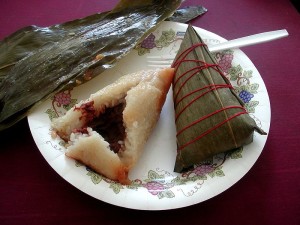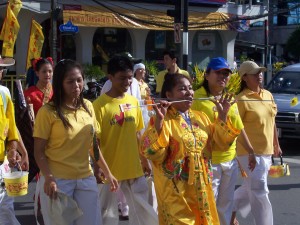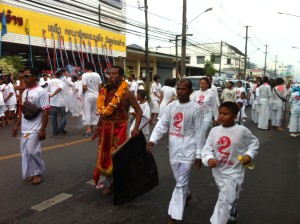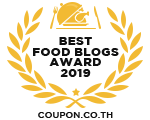Thai-Chinese Vegetarianism
The Vegetarian festival of Tesagan Gin Je is in full swing and the streets are lined with yellow. Mock meats and things unabashedly vegetarian are front and center in every market throughout the city. And it’s a lovely change of pace. Even at the predominantly Islamic market closest to me (no direct connection to any Chinese spiritual practice really) the old ladies in their hijabs have replaced the beef and chicken in things from sarapao to samosas.
 So let’s take a second and talk about Thai-Chinese vegetarianism, vegetarianism in Thailand in general, and some of the spiritual aspects of the festival that are unique to Thailand (though not too far a cry from Thailand’s cultural mélange that developed due to the role it has always played as a major trading crossroads and point of origin for many staple foods and resources in the region).
So let’s take a second and talk about Thai-Chinese vegetarianism, vegetarianism in Thailand in general, and some of the spiritual aspects of the festival that are unique to Thailand (though not too far a cry from Thailand’s cultural mélange that developed due to the role it has always played as a major trading crossroads and point of origin for many staple foods and resources in the region).
Vegetarian practices are incredibly common in the kingdom, all year round. I couldn’t find any exact numbers, but I would guess that the number of Thai people from most backgrounds consuming a vegetarian or semi-vegetarian (including milk, eggs, and maybe seafood) for some or all of the year has to be a rather large one. There are many reasons for this quickness to shy away from meat forever or just a little while.
One of the big motivators is spirituality. And no single spiritual path has any sort of corner on this in Thailand really. Whether it is from a sense of passivism and a desire to not cause harm – a desire some devotees, at least on occasion, will take so far as not to eat things like onions or garlic as having to pull the roots out of the ground will kill the plant – or, as in many cases, a desire to purge oneself of past sin or bad karma from previous lives, one aspect of spirituality or another often ties in with the drive to vegetarianism.
 Now, it starts to cross over into modernity at this point of the spiritual angle – cleanliness. While it may not have been a purely spiritual idea from its beginnings in the great dark before the dawn, the idea that eating animals is inherently unclean, both spiritually and physically, is a widespread fixture in the backs of many Thai minds – with no real relationship whatsoever to any specific religious or cultural background they might claim. It is a fixture of the mass consciousness that has grown together from disparate spiritual/religious origins.
Now, it starts to cross over into modernity at this point of the spiritual angle – cleanliness. While it may not have been a purely spiritual idea from its beginnings in the great dark before the dawn, the idea that eating animals is inherently unclean, both spiritually and physically, is a widespread fixture in the backs of many Thai minds – with no real relationship whatsoever to any specific religious or cultural background they might claim. It is a fixture of the mass consciousness that has grown together from disparate spiritual/religious origins.
This understanding of meat as unclean translates well into a modern mindset of health consciousness and fairness for all creatures. But many younger people will participate in the festival, or just try on vegetarianism of one form or another at a time or times in their lives, simply for health concerns. People will often abstain from or seriously limit meat while dealing with disease or recovering from injury, and this is not new. That history of the medicinal element of vegetarianism coupled with a general push both by the government and the people of Thailand towards promotion of their traditional means of maintaining health and fighting basic, everyday diseases or physical ailments like colds, food borne disease, muscular or orthopedic pains, digestive problems, conditions of the nervous system and on and on and on means that vegetarian practice in the kingdom is here to stay, and no one doubts for the better.
 Now, in Thailand, when they celebrate the Chinese vegetarian holiday of the “Nine Emperor Gods” on the Island of Phuket in southern Thailand they really pull out all the stops, bar no holds, and neither as nor give quarter. As I mentioned before the traditions of the celebrations there seem to go back about a 150 years to a time of great Chinese migration, and great sickness. There is also some suspicion that the practice of piercing and mutilating the body during the festival may have drawn inspiration from an Indian festival called Thaipusam as there are no corresponding practices in China itself.
Now, in Thailand, when they celebrate the Chinese vegetarian holiday of the “Nine Emperor Gods” on the Island of Phuket in southern Thailand they really pull out all the stops, bar no holds, and neither as nor give quarter. As I mentioned before the traditions of the celebrations there seem to go back about a 150 years to a time of great Chinese migration, and great sickness. There is also some suspicion that the practice of piercing and mutilating the body during the festival may have drawn inspiration from an Indian festival called Thaipusam as there are no corresponding practices in China itself.
The people piercing themselves for the festival are called “mah song” which essentially means horse of the gods. But they aren’t just driving things through their faces out of a masochistic fervor, there is great ceremony involved and they may play a great role in the community. The mah song are spiritual conduits, mediums for one or more of the gods and become possessed through the rights of cleansing and piercing. It is believed that their piercing and flagellation of themselves helps others be cleansed of their bad karma, and also that the gods may be able to help cure illness and infirmity or to answer pressing and difficult questions while using the body of the mah song as a vessel.
While many who have participated as mah song for many years say that the objects used for piercing were not always so large or of such strange nature as they are today – hedge clippers, guns, lawn care machinery, and nearly anything else – it still seems as though that the idea is that the gods themselves choose what sort of things the medium is to be pierced with.
That’s enough until next week when we’ll go over a few classic vegetarian and close enough to vegetarian recipes and a bit of food history.

